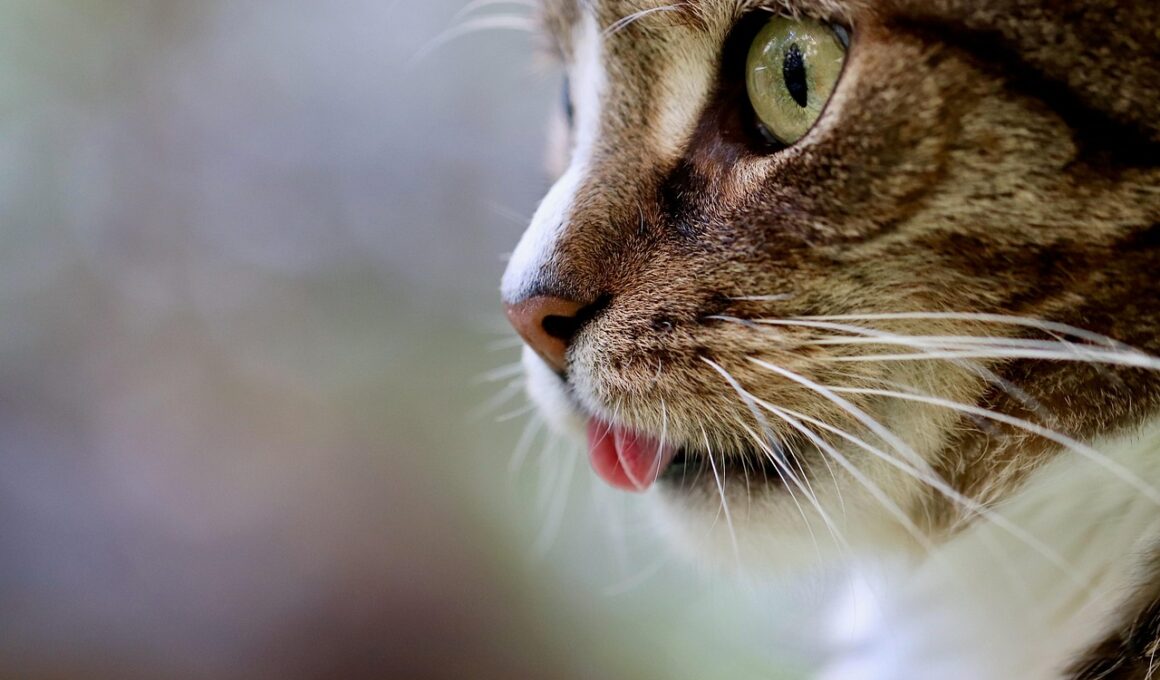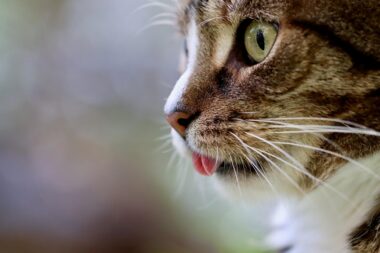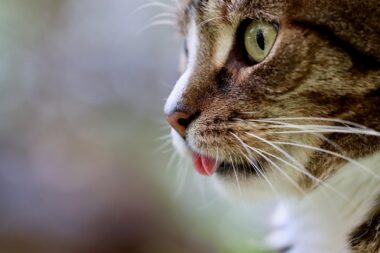Essential B Vitamins and Their Impact on Cat Energy Levels
Vitamins play a vital role in the overall health and energy levels of cats. Among these, B vitamins are particularly important. These vitamins help convert food into energy, thereby ensuring that your cat remains active and playful. Without adequate B vitamin intake, a cat may exhibit lethargy and a decrease in activity levels. It’s crucial for cat owners to understand the specific B vitamins and their unique roles. For instance, vitamin B1 or thiamine is essential for the proper functioning of the nervous system. As cats grow older, the need for these vitamins may increase, requiring careful attention to their diet. B vitamins also assist in preventing various health complications such as muscle weakness and neurological issues. Therefore, providing a balanced diet rich in these vitamins is paramount. Many commercial cat foods are enriched with B vitamins, but check the labels to ensure quality. Alternatively, consult your veterinarian if supplements would be beneficial for your feline friend. Energy levels heavily depend on the nourishment they receive, and adequate B vitamin intake can significantly improve their overall quality of life.
Vitamin B2, also known as riboflavin, is another important nutrient for cats. It aids in the metabolism of fats, proteins, and carbohydrates. This essential vitamin promotes healthy skin and fur, contributing to a cat’s vibrant appearance. A deficiency in riboflavin may lead to skin disorders or other health issues. Ensuring that your cat consumes a diet containing adequate amounts of riboflavin can help maintain optimal health and energy levels. Typically, meat-based diets provide ample riboflavin; however, vegetarian diets may lack this essential vitamin. Some commercial cat foods specifically address this need, making it easy for you to provide a balanced diet. Another vitamin to consider is B3, or niacin, which also supports energy metabolism. Without sufficient niacin, cats can develop serious health issues. It plays a significant role in enzyme function and helps maintain a healthy appetite. Additionally, B3 contributes to healthy nerve function and aids in the production of hormones. Observing your cat’s appetite and energy levels can serve as indicators for nutritional adequacy. Integrating B vitamins into your cat’s diet ensures they remain energetic, healthy, and happy.
The Role of Vitamin B6 in Cat Energy
Vitamin B6, also known as pyridoxine, plays a critical role in a cat’s energy production. It is involved in several biochemical reactions, enabling cats to access the energy stored in proteins and carbohydrates. Adequate levels of B6 are vital for maintaining a healthy metabolism. When cats lack this vitamin, they may quickly tire during play. Ensuring your cat receives enough B6 can enhance its energy and overall vitality. This vitamin also contributes to producing neurotransmitters, which affect mood and behavior. Therefore, a well-rounded diet is crucial for both physical and mental health. You may observe improved behavior alongside increased energy levels when the cat’s diet is supplemented with B6. Food sources rich in vitamin B6 include fish, meat, and certain vegetables. Many premium cat foods also contain added B6 to ensure that felines receive enough of this critical vitamin. Though deficiencies are uncommon in healthy cats, they can occur in certain situations, such as illness or poor diet. Always consult with a veterinary professional before making any adjustments to your cat’s diet, especially concerning vitamin supplements. Regular vet check-ups can help monitor your cat’s overall health.
Another essential B vitamin for cats is B12, or cobalamin. It is crucial for proper nerve and blood cell function. Vitamin B12 also aids in the synthesis of DNA and helps to maintain healthy skin and fur. A deficiency in this vital vitamin can lead to serious conditions such as anemia and neurological problems. Thus, ensuring your cat receives enough B12 is vital for maintaining energy and overall health. Cats can obtain B12 from animal-based proteins such as fish and meat, making it easier to incorporate into their diet. In some instances, especially with older cats, absorbing B12 can become an issue. If you’ve noticed changes in your cat’s energy levels or overall health, it might be worthwhile to consider their B12 intake. A veterinarian can perform blood tests to check levels and help determine if a dietary adjustment is necessary. Supplementing with B12 can often resolve deficiencies and revitalize energy levels. Keep in mind that when introducing new supplements, gradual changes are key in helping your feline friend adapt, ensuring that the transition is smooth and beneficial.
Energy and Mood Regulation
Maintaining a proper balance of B vitamins is essential for cats not only for energy levels but also for mood regulation. For instance, vitamin B9, or folate, significantly contributes to overall well-being. Folate is vital for mental and emotional health, helping to regulate mood and reduce anxiety in cats. Insufficient folate may lead to lethargy or behavioral changes, which can further affect energy levels. Cats who experience a well-balanced intake of all these vitamins will likely exhibit higher energy and positive behavior. The synergy between these vitamins ensures that cats can thrive in various environments. Regular play and interaction can also influence energy levels; thus, combining a nutrient-rich diet with an active lifestyle maximizes benefits. It’s important to understand that each B vitamin serves a unique purpose but works together harmoniously. Furthermore, excessive deficiencies can cause more severe problems, so awareness is key. If behavioral changes arise, consult your veterinarian for tailored dietary advice. They can help stimulate a tailored diet plan to meet your cat’s unique needs, ensuring they remain energetic and content.
Monitoring the energy levels and nutritional needs of your cat is critical. Regular vet visits can help track your feline’s health status, ensuring all essential nutrients, including B vitamins, are being met. This proactive approach can identify any deficiencies early on and help adjust their diets accordingly. Being observant of your cat’s behavior, including activity levels and eating habits, often highlights nutritional shortcomings. For instance, a sudden drop in energy may indicate that certain vitamins are lacking in their diet. It’s vital to observe if your cat appears sluggish or less playful, as these can be indicators of vitamin deficiency. Incorporating high-quality cat food that lists B vitamins as primary ingredients can mitigate these issues. Products specifically formulated for energy support can also be beneficial. On top of maintaining a balanced diet, giving your cat plenty of mental and physical stimulation is essential. Engaging them in playtime, providing scratching posts, or interactive toys can boost energy levels. Such efforts complement their nutritional intake and elevate their overall well-being, making them happier and healthier companions.
Conclusion: The Importance of a Balanced Diet
The importance of incorporating essential B vitamins in your cat’s diet cannot be overstated. These vitamins are crucial for maintaining energy levels, mood, and overall health. They aid in converting food into energy, ensuring your cat remains active and engaged. A balanced diet that includes a variety of meats, vegetables, and possibly supplements can enhance the feline’s health remarkably. Always check for key nutrients on cat food labels, ensuring proper amounts of B1, B2, B3, B6, B9, and B12 are included. If uncertain about your cat’s dietary needs, consulting with a veterinarian can help tailor a diet plan that best suits your pet’s unique requirements. Remember to observe your cat’s behavior closely as it can indicate overall well-being or potential health issues. Additionally, combining proper nutrition with routine exercise and mental stimulation will significantly enhance your cat’s energy levels and quality of life. Keeping your furry friend healthy and happy begins with a focus on their dietary needs, significantly enhancing their vitality and longevity. Embrace the responsibility of nurturing your cat’s dietary needs for a rewarding and energetic life together.
Understanding the role of B vitamins in feline nutrition highlights the importance of a proactive approach to your cat’s diet. Regularly reviewing food components and ensuring sufficient vitamin intake contributes to well-rounded health and vitality. Do your best to provide a nourishing diet or seek specialized foods that meticulously include these essential vitamins. Taking care of your cat’s health is a lifelong commitment. Providing educational resources helps you better equip yourself to manage your cat’s nutritional demands effectively. Ultimately, your actions will directly influence your feline’s happiness and energy levels. Remember, a well-fed cat is an energetic and lively companion, making your efforts worthwhile.





